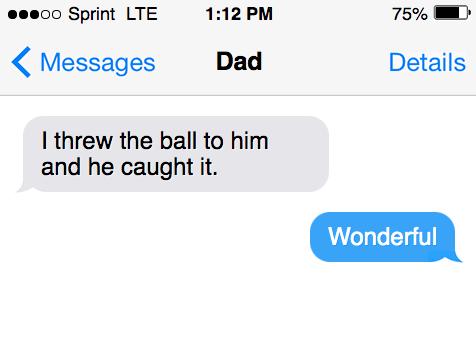What’s the difference between threw vs. through? You can’t tell when a comment calls for a particular spelling in everyday conversation. But when writing, it’s essential to know what version of the word to use.
Threw and through: homophones
Threw and through are examples of homonyms; the terms sound precisely the same and have the same pronunciation but have entirely different meanings.
So at first, it can be challenging to know when to use these commonly confused words.
However, it is easy to tell them apart once you know how to use these different words.
The difference between threw vs. through
Threw is the past tense form of the verb “throw.”
And throw means to launch an object into the air, typically using your hand.
“Throw” is a term used in many phrasal verbs; a phrase that combines a verb with a preposition or adverb (or both) that functions as a verb with a meaning that is different from the combined meanings of the individual words.
“Throw” is also a part of several common idioms and phrases used in informal writing or conversation.
Common idioms, like “it’s only a stone’s throw away,” are usually figurative and not understandable simply by the words in the phrase.
Through, on the other hand, can be used as a preposition or an adverb.
Threw: the past tense form of throw
“Threw” has several meanings.
The term is the past tense of the verb throw, usually used to describe movement through the air either by hand or with a device.
Additionally, “threw” can mean to move to dislodge something and move something suddenly or forcefully.
“Threw” can also mean to lose a game or match deliberately.

The meaning of through
Through is an example of a term that can function in multiple ways; as an adjective, adverb, or a preposition.
The term often suggests a complete or free passage from one side to another.
As an adjective, “through” can mean that something is finished, over, or completed.
Lastly, the term can act as a preposition, meaning by, using, or as a result of.
How to use thru
Today, “thru” is an informal spelling, although it was used long before “through.”
Early on, English was a phonetically written language influenced by Old Norse and French spellings, eventually leading to the spelling “through.”
Essentially, the two words are the same and have the same meaning.
Origin of threw: Middle English word meaning
Throw or throwing is the present tense of threw.
“Throw” came from the term throwen, a Middle English term meaning to hurl, wring, or twist.
Going even further back, “throwen” originated from “thrawan,” another Old English word meaning to throw or twist.
When to use “through”
In writing, the term through has different meanings.
It can be used to refer to movement into one end and out the other side.
When it’s used as an adjective, through means finished or done.
Finally, as an adverb, the word can mean forward and backward, entirely, up to and including, or to the end.
When to use “threw”
“Threw” is the past tense form of the action term “throw.”
So, if you write a sentence in which someone launched or tossed something, you can use the term threw.
When describing something in the past tense, you must use the correct tense of the word.
So, instead of “he throws the ball” (present tense), the article would change to “he threw the ball.”
When to use “thru”
In writing, thru is the informal way to spell through.
The difference between thru and the formal term is simply the spelling.
Still, here are some ways to use “thru.”
Of course, you can use “thru” to replace “through,” but it isn’t correct by standard American English standards.
Examples:
“The drive-thru sign says you can get two chicken sandwiches for the price of one today.”
“I think you should save the old drive-thru sign your grandpa gave you.”
Examples of how the word “threw” gets used
Different spellings of threw vs. through mean there are different ways they are used in a sentence.
Here are some ways to use the term correctly.
Examples:
“The opposing team lost early, so they threw the game to get home earlier.”
“The horse threw its rider because of the sudden noise.”
“His words threw me off guard; I wasn’t expecting such a powerful speech.”
“The pitcher threw the ball at least 80 miles per hour.”
“The comment threw her for a loop because it lacked factual evidence.”
“Jody threw the ball at the sign to set an example of how proper throwing should look.”
Examples of how “through” gets used
Because threw and through sound alike, it can be confusing to know when to use each term.
Here are some different ways you can utilize the term in your writing.
Examples:
“The bus took about an hour to pass through the tunnel in the city.”
“The car drifted through the whole distance of the underpass.”
“Once you get to one side of the door, simply pass through without making a sound.”
“You can avoid making mistakes through careful planning and watching what you comment online.“
“Through the years of writing the same article, he gained a lot of respect from other journalists.”
How to remember which word to use
When it comes down to it, it is relatively simple to remember which term to use.
You use “threw” to describe the previous tense of “throw.”
“Through” is used as a preposition, adverb, or in replacement of the phrase “by means of.”
Lastly, “thru” is the informal way to spell “through.”
Therefore, average grammar tips recommend staying away from this form of the term.
Sources
- throu – Middle English Compendium
- Threw vs. Through: What’s the Difference?
- Through – Definition, Meaning & Synonyms – Vocabulary.com
- Thru vs. Through – How to Use it Correctly
- Thru vs. Through—What is Right? – Grammarly
- 7 Everyday English Idioms and Where They Come From
- Phrasal verb Definition & Meaning – Merriam-Webster
- How to pronounce thrawan | HowToPronounce.com
- Examples of Homonyms
- Homonym – Wikipedia
- “How ‘Thru’ Turned Into ‘Through’: And Then to ‘Thru’ Again.”
Inside this article
Fact checked:
Content is rigorously reviewed by a team of qualified and experienced fact checkers. Fact checkers review articles for factual accuracy, relevance, and timeliness. Learn more.
Core lessons
Glossary
- Abstract Noun
- Accusative Case
- Anecdote
- Antonym
- Active Sentence
- Adverb
- Adjective
- Allegory
- Alliteration
- Adjective Clause
- Adjective Phrase
- Ampersand
- Anastrophe
- Adverbial Clause
- Appositive Phrase
- Clause
- Compound Adjective
- Complex Sentence
- Compound Words
- Compound Predicate
- Common Noun
- Comparative Adjective
- Comparative and Superlative
- Compound Noun
- Compound Subject
- Compound Sentence
- Copular Verb
- Collective Noun
- Colloquialism
- Conciseness
- Consonance
- Conditional
- Concrete Noun
- Conjunction
- Conjugation
- Conditional Sentence
- Comma Splice
- Correlative Conjunction
- Coordinating Conjunction
- Coordinate Adjective
- Cumulative Adjective
- Dative Case
- Determiner
- Declarative Sentence
- Declarative Statement
- Direct Object Pronoun
- Direct Object
- Diction
- Diphthong
- Dangling Modifier
- Demonstrative Pronoun
- Demonstrative Adjective
- Direct Characterization
- Definite Article
- Doublespeak
- False Dilemma Fallacy
- Future Perfect Progressive
- Future Simple
- Future Perfect Continuous
- Future Perfect
- First Conditional
- Irregular Adjective
- Irregular Verb
- Imperative Sentence
- Indefinite Article
- Intransitive Verb
- Introductory Phrase
- Indefinite Pronoun
- Indirect Characterization
- Interrogative Sentence
- Intensive Pronoun
- Inanimate Object
- Indefinite Tense
- Infinitive Phrase
- Interjection
- Intensifier
- Infinitive
- Indicative Mood
- Participle
- Parallelism
- Prepositional Phrase
- Past Simple Tense
- Past Continuous Tense
- Past Perfect Tense
- Past Progressive Tense
- Present Simple Tense
- Present Perfect Tense
- Personal Pronoun
- Personification
- Persuasive Writing
- Parallel Structure
- Phrasal Verb
- Predicate Adjective
- Predicate Nominative
- Phonetic Language
- Plural Noun
- Punctuation
- Punctuation Marks
- Preposition
- Preposition of Place
- Parts of Speech
- Possessive Adjective
- Possessive Determiner
- Possessive Case
- Possessive Noun
- Proper Adjective
- Proper Noun
- Present Participle
- Prefix
- Predicate



